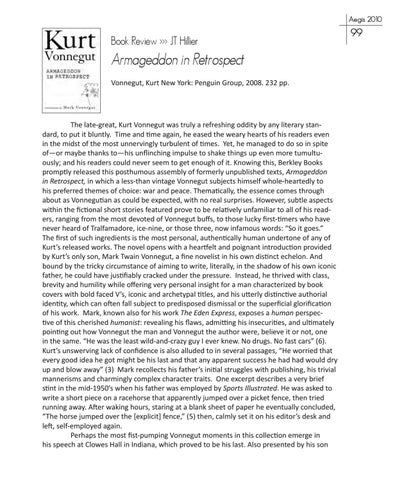Aegis 2010
Book Review >>> JT Hillier
Armageddon in Retrospect Vonnegut, Kurt New York: Penguin Group, 2008. 232 pp.
The late-great, Kurt Vonnegut was truly a refreshing oddity by any literary standard, to put it bluntly. Time and time again, he eased the weary hearts of his readers even in the midst of the most unnervingly turbulent of times. Yet, he managed to do so in spite of—or maybe thanks to—his unflinching impulse to shake things up even more tumultuously; and his readers could never seem to get enough of it. Knowing this, Berkley Books promptly released this posthumous assembly of formerly unpublished texts, Armageddon in Retrospect, in which a less-than vintage Vonnegut subjects himself whole-heartedly to his preferred themes of choice: war and peace. Thematically, the essence comes through about as Vonnegutian as could be expected, with no real surprises. However, subtle aspects within the fictional short stories featured prove to be relatively unfamiliar to all of his readers, ranging from the most devoted of Vonnegut buffs, to those lucky first-timers who have never heard of Tralfamadore, ice-nine, or those three, now infamous words: “So it goes.” The first of such ingredients is the most personal, authentically human undertone of any of Kurt’s released works. The novel opens with a heartfelt and poignant introduction provided by Kurt’s only son, Mark Twain Vonnegut, a fine novelist in his own distinct echelon. And bound by the tricky circumstance of aiming to write, literally, in the shadow of his own iconic father, he could have justifiably cracked under the pressure. Instead, he thrived with class, brevity and humility while offering very personal insight for a man characterized by book covers with bold faced V’s, iconic and archetypal titles, and his utterly distinctive authorial identity, which can often fall subject to predisposed dismissal or the superficial glorification of his work. Mark, known also for his work The Eden Express, exposes a human perspective of this cherished humanist: revealing his flaws, admitting his insecurities, and ultimately pointing out how Vonnegut the man and Vonnegut the author were, believe it or not, one in the same. “He was the least wild-and-crazy guy I ever knew. No drugs. No fast cars” (6). Kurt’s unswerving lack of confidence is also alluded to in several passages, “He worried that every good idea he got might be his last and that any apparent success he had had would dry up and blow away” (3) Mark recollects his father’s initial struggles with publishing, his trivial mannerisms and charmingly complex character traits. One excerpt describes a very brief stint in the mid-1950’s when his father was employed by Sports Illustrated. He was asked to write a short piece on a racehorse that apparently jumped over a picket fence, then tried running away. After waking hours, staring at a blank sheet of paper he eventually concluded, “The horse jumped over the [explicit] fence,” (5) then, calmly set it on his editor’s desk and left, self-employed again. Perhaps the most fist-pumping Vonnegut moments in this collection emerge in his speech at Clowes Hall in Indiana, which proved to be his last. Also presented by his son
99



